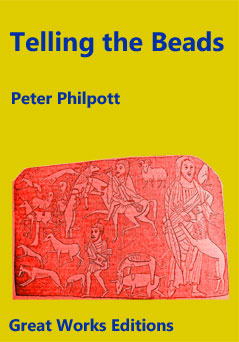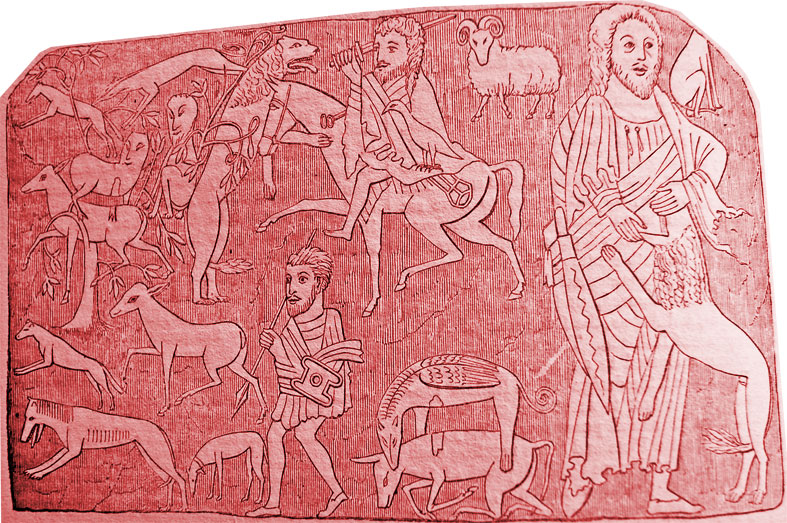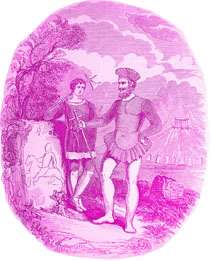 texts page
texts page  Notes on Telling the Beads
Notes on Telling the Beads

Sections have been published online on e·ratio, and here on Great Works also.
Telling the Beads is a calendrically organised serial poem, written between July 11, 2016 and June 21, 2017. Its structure is based on the Anglo-Saxon calendar described by the Venerable Bede in his work, De temporum ratione. This is centred on an explanation of the Roman system used to calculate Easter (the Right, as opposed to the Wrong method used by British and Irish Christians, the so called "Celtic" Church), but extends much more widely. His account of the Anglo-Saxon calendar is essentially a listing of the Old English names for the months (which though lunar seem to be assumed to correspond to those of the Roman calendar), some explanation of their names (one of which, that for February/Hreth Monath, is notoriously unclear), and some statements about ritual activities undertaken at these times also. In terms of Anglo-Saxon religion, Bede is sometimes queried by much more knowledgeable contemporary academics: he doesn't mention at all Woden, Thunor, all that Gods of the North pantheon we know they worshipped — and surely everyone wanted to go to Valhalla etc?
I am in agreement with Bill Griffiths, whose Aspects of Anglo-Saxon Magic (Anglo-Saxon Books, 2003) I read only near the end of writing the sequence, that actual, popular Anglo-Saxon religion is likely to be separate from the high status elite warrior cults, and would be connected much more with ensuring a sufficiently good harvest to be able to survive the winter, and generally coping with life on the daily lived level. The other stuff is ideological justification for the upper-class male aggression that maintains the elite in place. What we get in Bede's account is what he learnt maybe from his household as a child before he entered a monastery, and also observed probably still taking place in the population around him. To assume he was either mistaken or fantasising (for some unknown purpose) is unwarranted and stupid.
So, the religious tone of the calendar is linked to goddesses (the famous and still-celebrated Eostre, the not-so-famous Hretha, the Mothers who presided over the opening of Yule — the calendar seems to include Geola/Yule and Litha [same word as our lithe] as intercalated solstice festivals); and to various ritual practices involving cakes and sacrifices. "Cakes" is the standard translation for Bede's "placentae", pleasing things, suggesting tasty titbits, and probably referring to something more like drop scones or little buns (spiced? sweetened with honey? or fruit/concentrated fruit juice?) than the masterpieces of The Great British Bake Off, or our fetishised over-iced "muffins" — but a delightful word given cakes' contemporary cultural prominence.
 The other primary influence on the sequence was Brecht. Die Hauspostille (1927), his first collection of poems, is a glorious text, that ought to be more widely known — the only published translation is Manual of Piety, translation by Eric Bentley for Grove Press (1966, and still in print) — though I know better Amos Weisz's not quite finished translation. A "postil", to use the very infrequent English word, is a German genre of devotional homilies and meditations, designed, as Brecht's title indicates, for personal or household use. Brecht's version is superbly varied: many harsh and bitter ballads from the point-of-view of the dispossessed and the exploited, ballads and poems satirising characters (including "On the Poor B.B."), songs of fantasy and international exploitation (including the Mahagonny Songs and anti-war songs), some beautiful and meditative lyrical episodes, ending with the totally disabused "Do Not Let Them Fool You!"
The other primary influence on the sequence was Brecht. Die Hauspostille (1927), his first collection of poems, is a glorious text, that ought to be more widely known — the only published translation is Manual of Piety, translation by Eric Bentley for Grove Press (1966, and still in print) — though I know better Amos Weisz's not quite finished translation. A "postil", to use the very infrequent English word, is a German genre of devotional homilies and meditations, designed, as Brecht's title indicates, for personal or household use. Brecht's version is superbly varied: many harsh and bitter ballads from the point-of-view of the dispossessed and the exploited, ballads and poems satirising characters (including "On the Poor B.B."), songs of fantasy and international exploitation (including the Mahagonny Songs and anti-war songs), some beautiful and meditative lyrical episodes, ending with the totally disabused "Do Not Let Them Fool You!"
The religiosity in my manual of piety is other than his passionate revolutionary anti-Christianity and materialism (sympathetic though I am to it). Materialism and rationalism seem to me to have been revealed as being as arid and ill-suited to good human life as what the various monotheisms have ended up as becoming. I would call myself a HardKore Polytheist Agnostic. Human beings, I think much evidence suggests, tend to need some sense of Radical Otherness to make sense of their and this world's existence and exigency. Further, I increasingly feel that monotheism, which I was always taught was a crucial apart of "human progress", is a disaster. By definition it is exclusive of genuine otherness, accepting only a single blinkered view. Its record has always one of persecution once it becomes in any way linked with power — they are all drenched in blood. And there is, too, the curious circumstance that the One True God is always explicitly male gendered. Come off it!
I explore what a polytheist, goddess-oriented religious sense could be like.
A third input came from our then-current household calendar, the one in the kitchen where you put down coming events and dates. This was — oh shame! — The Official Tolkien Calendar 2016, for this year focused on superb images by Tove Jansson — so can be forgiven. It uses her illustrations (mainly ink drawings) for The Hobbit (Bilbo — en hobbits äventyr [1962] and Lohikäärmevuori, eli Erään hoppelin matka sinne je takaisin [1973]). These fed into the sequence as I decided the third holy day text for each month should be a based on a prose description of the month's calendar illustration, but not referring to The Hobbit's narrative (which anyway is started halfway through and then has the book's opening halfway through the sequence). A Migration Age warband on the loose appeared, on some hopeless and complicated quest.
 An important character emerged when I was reading PH Reaney, The Origins of English Surnames (Routledge & Kegan Paul, 1967), in a section titled "Three names of mythological interest" in the chapter dealing with surnames derived from personal names. Here, linked to the well known (comparatively) Wade and Wayland, occurs Unwin (from Old English Unwine, un-friend), of whom even less is known, and I had never heard of before as a legendary hero. He, therefore, became a central character in my highly unreliable vision of Migration Age Britain. You may read some more serious background to this period in the essay "Not a Note on Some Matters with Britain" in Wound Scar Memories (also available on academia.edu). Other Unwins offered further tones, too personal apart from, of course, the great Professor Stanley Unwin. He perfected the British Comedy School's negative critique of Theory and Discourse: pure language-based and language-critical comedy for all.
An important character emerged when I was reading PH Reaney, The Origins of English Surnames (Routledge & Kegan Paul, 1967), in a section titled "Three names of mythological interest" in the chapter dealing with surnames derived from personal names. Here, linked to the well known (comparatively) Wade and Wayland, occurs Unwin (from Old English Unwine, un-friend), of whom even less is known, and I had never heard of before as a legendary hero. He, therefore, became a central character in my highly unreliable vision of Migration Age Britain. You may read some more serious background to this period in the essay "Not a Note on Some Matters with Britain" in Wound Scar Memories (also available on academia.edu). Other Unwins offered further tones, too personal apart from, of course, the great Professor Stanley Unwin. He perfected the British Comedy School's negative critique of Theory and Discourse: pure language-based and language-critical comedy for all.
OK. So that's the mix. Each month begins with a text composed of a poem (in a simple strophic form to be used for that month), and then a sentence and a further short poem in an open field form. These latter two rigorously and programmatically employ vocabulary taken from Wound Scar Memories. Following this is a series of poems (in principle in the same form as the month's initial poem), brief prose passages, and combinations thereof. These are allocated to specific days — from "A Day Which Is Someone's Birthday" via "A Day for Waiting for the Next Cold Spell to Hit" to "A Day for Considering the State That We Are in". Each month, until midwinter, the number of these holy day and their texts increases by one — each with its own format and following the same sequence — then each month loses one until midsummer. In addition, Yule has, of course, twelve days, each with its own little text, and Lithe, three. Obviously you can take a lot of time off on the middle of winter, but summer's a busy period.
I tend to overdo such things. Yet they are needed. I sent out notes with the year-long email posting of Telling the Beads. These I have expanded a little, and they are available on Notes on Telling the Beads, as referred to in the book's introduction. A reading of the essay entitled "Not a Note on Some Matters with Britain" in Wound Scar Memories is recommended also, for the Attacotti, Cerdic and other more general things. It is also available online on Academia under the less riddling title of "A Note On Some Matters with Britain".